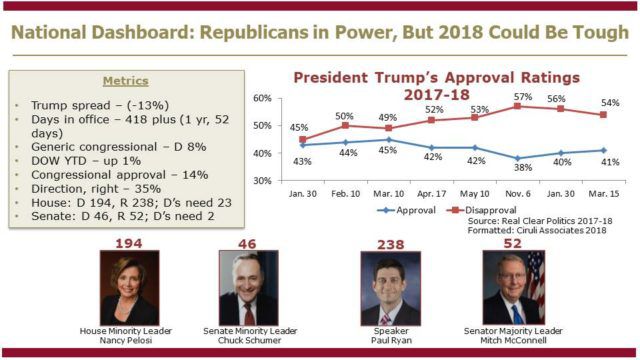CIRULI | Will a wave from D.C. wash over Colorado?

The ever controversial Nancy Pelosi now only needs 23 more Democrats to win control of the House after the victory in Pennsylvania’s 18th District. Although it is clear that her time as head of the Democratic caucus is nearing a conclusion, she remains a powerful force. Democratic candidates in swing districts can get political mileage by denouncing her as Conor Lamb did to help him win the Pennsylvania House seat, yet still take money from the Democratic Congressional Campaign Committee (DCCC), which she helps fund.
If the Alabama Senate race looked like an exception, the lessons from the Pennsylvania congressional race are too obvious for President Trump or Republicans to ignore. Is there a wave building? That is a critical question for Congressman Mike Coffman, who is the Colorado Republican most vulnerable to a Democratic wave. Coffman has survived waves before. He tends to run well ahead of the party. He won the district by 31,000 votes, while Hillary Clinton was winning it by 34,000. But the Pennsylvania race suggests Republican candidates are especially vulnerable among suburban voters who are contributing to Trump’s high disapproval ratings.
Also, could Trump, who was particularly unpopular in Colorado in 2016, affect non-federal candidates (i.e., governor and statewide officeholders), in 2018? Colorado’s constitutional statewide elections are held in even numbered non-presidential years, primarily to keep presidential coattails from affecting the results. And, it’s mostly worked. Democrats controlled the governorship during the mid-1970s through the 1990s, while Republicans often controlled the White House.
Although there are a myriad of factors effecting state races, the growing polarization since the G.W. Bush presidency appears to bring presidential politics deeper into the state. Bill Ritter won the governorship by 13 points in 2006 – a very good national Democratic year – against Bob Beauprez, whereas incumbent John Hickenlooper could only manage a 3-point win in 2014 over the same Bob Beauprez during a very good Republican year.
The Dashboard was created a few years ago to offer a quick snapshot on the status of Washington and its influence on congressional races. Although the data on the March 2018 Dashboard has not changed much as President Trump is still at about 41 percent approval and 54 percent disapproval, and Democrats have a generic lead of 8 points, the election results from the field have confirmed the historic trend – Republicans are in trouble.

The Pennsylvania congressional win of Democrat Conor Lamb is especially problematic.
Although 2018 begins well for Democrats, there are still seven months until Election Day, and the economy is strong and shows signs of maintaining growth. Although the tax cuts haven’t moved opinion yet, it’s early.
Democrats also have challenges. They are divided between their pragmatic and ideological wings shown in the recent votes on banking reform. Although guns and #MeToo are two national issues helping drive Democratic passion, some of the national party’s cultural positions remain a hard sell with many moderate suburban voters.
Mike Coffman’s seat, the governor’s race, other constitutional offices – even control of the state legislature – may be affected by the political force radiating from D.C. All politics may be local, but Pelosi and Trump may be the main influences in 2018.














